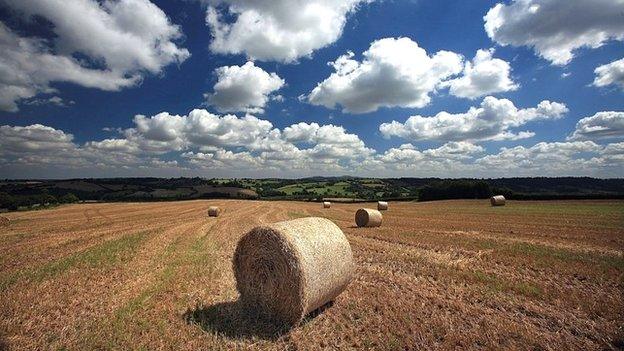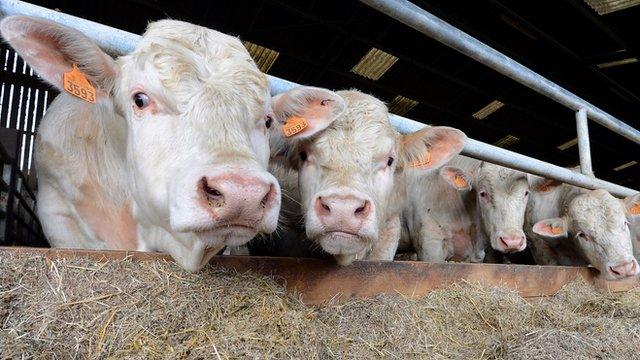Farm wildlife protection plan 'fails'
- Published

A bid to protect wildlife and give value to the funding of Europe's farm policy by taxpayers has failed, a damning study suggests.
Farm subsidies cost every EU household more than 490 euros (£400) a year, and a process of reforms aimed to ensure the cash helps the environment.
But the report in Science journal calculates that 88% of farms will be exempted from key green measures.
Europe's farm union says the original greening proposals were unrealistic.
The paper argues that the "greening" of the 363bn euro (£295bn) farm policy could actually make the environment worse unless member states take individual action to protect wildlife.
Its authors warn that already some states have moved in the opposite direction and transferred still more funds away from wildlife.
The greening plan involves rewarding farmers for three main activities: keeping grassland; creating environmental focus areas; and growing at least three crops on any farm bigger than 30 hectares.
The report says the rules governing these are so vague as to be useless. Farmers can get paid for replacing species-rich wildflower meadows with "monocrop" grass for cattle; the EFAs don't have proper guidance; and there's no evidence that growing three crops on a big farm helps the environment at all.
What's more, the reform will allow a 5% loss in grassland - Europe's most endangered habitat.
'Ineffectual' step
A lead author, Lynn Dicks from the department of zoology at the University of Cambridge, told BBC News: "Politicians are talking about the greening of the Common Agricultural Policy - it's a nonsense. If a firm made these sort of claims it would be stopped by advertising standards.
"It was a good idea to make greening compulsory for farmers to get their grants but the trouble is that the plan was so diluted in the negotiations that it's completely ineffectual."
Ariel Brunner from Birdlife is angry that the greening, according to the report, will do little or nothing to help species like farmland birds which have been in freefall because of intensive farm methods. "EU citizens were promised a green reform but handed a 'greenwash'. Dramatic loss of biodiversity in the countryside must be addressed," he said.
The Commission's original greening plan came under attack from farmers and farm ministries in member states. Even the authors of the Science paper admit it is extremely hard to impose a blanket environmental policy across the diverse landscapes in Europe.
The Secretary-General of the EU farm union, Copa-Cogeca, Pekka Pesonen, told BBC News: "We do not believe the measures initially proposed by the Commission would have had any real beneficial effect on the environment.
"It also makes no sense to take land out of production when food demand is on the rise, and estimated to increase by 60% by 2050.
That is why Copa-Cogeca advocates green growth measures: measures which benefit the environment at the same time as maintaining production capacity, efficiency and employment. The final agreement on CAP reform is more realistic and practical to apply than the original proposal."
The authors of today's paper argue that is short-sighted. They say: "Intensification clearly provides some short-term economic gains for farmers and the food industry. But these have to be weighed against the loss of public goods such as climate stability, landscape quality and biodiversity. The EU has lost a chance to improve agricultural sustainability."
Immense freedom
The next chance will be in 2020, when the new CAP period ends. The policy currently swallows 40% of the EU budget and leaders are attempting to whittle it down stage-by-stage in the face of ferocious opposition by farmers threatening a loss of political support in rural constituencies.
That is what happened in the UK, where the Environment Secretary Owen Paterson planned to divert the maximum 15% of farm subsidy towards the environment but was overruled after the NFU lobbied the Prime Minister and forced him to lower the amount to 12%.
Member states still have, though, immense freedom to determine their own policies under the CAP.
Lynn Dicks said: "Individual countries can turn this around, and use the CAP to protect their agricultural environments. They can maintain or even increase the budget for agri-environment schemes, and design good targeted measures that make it profitable to farm in a way that protects ecosystems. They can define Ecological Focus Areas to include required management.
"They can use the permanent grassland greening measure to protect valuable grasslands by properly mapping where the important grasslands are. They can improve the implementation of Ecological Focus Areas even without prescribed management, by ensuring decent ecological advice is delivered to farmers. Let's hope they do it."
A Commission spokesman said: "Obviously there were elements of compromise in the final political agreement on CAP reform, but it is very important that the instrument of Greening is now there."
He said if governments apply measures in a way which does not enhance biodiversity, the Commission has the power to recuperate some of the funds.
Dr Dicks said she could not see a mechanism under EU law for making this happen.
Follow Roger on Twitter, external.
- Published26 September 2013

- Published1 July 2013